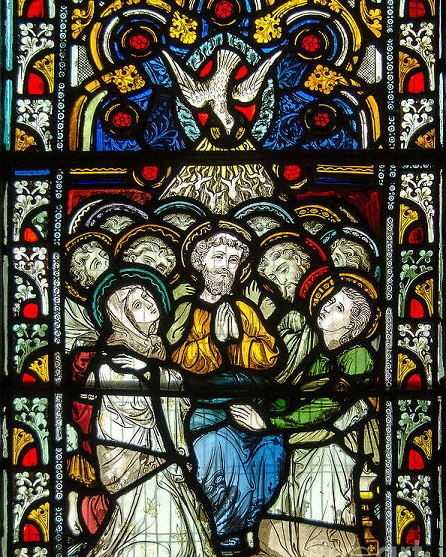Readings: Genesis 11:1–9 | Acts 2:1-21 | John 14:23-31
Text: John 14:23-31
We often think of the Day of Pentecost in the past tense. Around May 11 in the year 33 (or 29),[1]
“they were all together in one place. And suddenly there came from heaven a sound like a mighty rushing wind, and it filled the entire house where they were sitting. And divided tongues as of fire appeared to them and rested on each one of them. And they were all filled with the Holy Spirit and began to speak in other tongues as the Spirit gave them utterance.”[2]

That day, there were miraculous signs at which the people wondered. Peter stood up and gave a miraculous, multi-lingual sermon, and that day 3,000 people believed and were baptized. Such an event catches our attention, but nobody has seen it since.
Many Christians are misled by teachers who claim to recapture the wonders of that day. They claim the Holy Spirit always causes people to speak in new tongues. But as one pastor noted, it’s like children who get so distracted with the wrapping paper that they ignore the gift itself.[3] The great miracles that accompanied Pentecost are just wrapping on the gift of multitudes believing in Jesus and being baptized for the forgiveness of their sins. So, the real center of Pentecost is not the impressive signs, but the last verse Peter quotes from the prophet Joel: “And it shall come to pass that everyone who calls upon the name of the Lord shall be saved.”[4] That’s of course, why the selection for the Second Reading ends at that verse.
And if that’s the main point of Pentecost, it’s certainly not just a past event that we long for or try to recreate. If you think about it, isn’t it interesting that the charismatic movement claims to recreate the events of Pentecost, even though this was the once-in-time birth of the Christian Church, but nobody thinks to recreate the crucifixion and resurrection of our Lord, which was accomplished once for all. The Holy Spirit is a very present help, because Pentecost is about the peace which the Holy Spirit delivers to souls from every nation. To you, He brings the peace with God of your sins forgiven.
In fact, the Holy Spirit has always been God’s messenger of peace. The newly formed creation fell through the unfaithfulness of Adam and Eve. By just the 10th generation of the human race,[5] people had become so corrupt that God said, “I am sorry that I have made them.” So God planned judgment against all of sinful humanity in the Flood, but “Noah found favor in the eyes of the Lord.”[6] God showed mercy by delivering sinful Noah and his family from the “torrents of destruction.”[7] The Lord called them into the safety of the ark while the rest of the unbelieving world was judged. Then at the end of the flood, Noah sent out a dove. At first, the dove returned because she “found no place to set her foot.” But 7 days later, Noah sent the dove out again, and “behold, in her mouth was a freshly plucked olive leaf. So, Noah knew that the waters had subsided from the earth.”[8] The dove returned as the messenger that God’s judgment was complete. She proclaimed a new peace between God and man for all who believe.

Then there was the Prophet Ezekiel’s vision of the valley of dry bones (chapter 37). “The hand of the Lord was upon me, and he brought me out in the Spirit of the Lord and set me down in the middle of the valley; it was full of bones. 2 And he led me around among them, and behold, there were very many on the surface of the valley, and behold, they were very dry.”[9] They were the bones of sinful, dead people. In their despair, they said, “Our bones are dried up, and our hope is lost; we are indeed cut off.”[10] They had fallen under God’s just condemnation. But the Lord also said, “Why will you die, O house of Israel? I have no pleasure in the death of the wicked, but that the wicked turn and live”[11] So the Lord commanded Ezekiel to prophesy to the breath: “O dry bones, hear the word of the Lord. Thus says the Lord God to these bones: Behold, I will cause breath to enter you, and you shall live.”[12] The breath of God, which is His Spirit, proclaimed peace and resurrection to those slain by sin.
Finally at the banks of the Jordan, the Spirit appeared again. God’s only-begotten Son, Jesus, came to the river and was baptized by John. “And when Jesus was baptized, immediately he went up from the water, and behold, the heavens were opened to him, and he saw the Spirit of God descending like a dove and coming to rest on him; 17 and behold, a voice from heaven said, ‘This is my beloved Son, with whom I am well pleased.’”[13] Just as the dove on the Ark announced the end of judgment, the Spirit announced the end of God’s wrath in His own beloved Son. Just as the Spirit raised those dry, slain bones of sinners, the Spirit preaches peace and resurrection in Jesus, the Christ.
In the Gospel, Jesus says, “These things I have spoken to you while I am still with you. But the Helper, the Holy Spirit, whom the Father will send in my name, he will teach you all things and bring to your remembrance all that I have said to you.” In the scope of all time, Jesus was with us for a tiny fraction of that time, just over thirty years.[14] If salvation only happened for Jesus’ contemporaries, all the people before and all of us after are lost. But in that short period of time, Jesus accomplished foretold, everything necessary for the salvation of the world. He was born and shares in our flesh, yet without sin. He was perfect in His fear, love, and trust in God above all things and He perfectly loved His neighbor as Himself. He was also the perfect atonement for our sins. God raised Jesus from the dead, never to die again. Finally, as true God and true Man, He ascended to God the Father to blaze our way to heaven, and serves as our heavenly High Priest. All of that took place over the course of 33 years, but the results are eternal.
Just before the Gospel reading starts, in verse 16, Jesus tells His disciples, “I will ask the Father, and he will give you another Helper, to be with you forever.” The Helper, the Holy Spirit, is the one who draws people—past, present, and future—to call upon the Lord Jesus and be saved. He does this through the powerful Word of God, which He “brought to the remembrance” of the Apostles. In the Spirit, they wrote the New Testament as the trustworthy record of God’s Word. Now, the same Spirit calls you to believe through the Scriptures.

And the Holy Spirit is more than simply a memory aid. What the ESV translates as “Helper” is literally Paraclete—an Advocate, or Counselor. Luther said this about the Spirit’s title:
[It] designates a person who acts as counsel for one who is accused or charged with some crime, and who in that capacity undertakes to defend him and win his case, to advise and aid him, and to admonish and encourage him as occasion may require.[15]
The Holy Spirit takes an active role in bringing the word of Christ to our minds and hearts. And we desperately need His aid! The devil, the world, and our flesh are also busy trying to make us forget Christ’s Word and substitute it with some man-made imitation. Like the Catechism says, “God’s will is done when He breaks and hinders every evil plan and purpose of the devil, the world, and our sinful nature which do not want us to hallow God’s Name or let His kingdom come.” This work is not as simple as forgetting God’s Word. The work of God’s enemies is so that we profane God’s Name by not taking Him at His Word and making the Gospel into a new burden. Rather than, “Everyone who calls on the name of the Lord will be saved (period),” they would have us add our own works to prove we’re genuine, true Christians. In a dreadful wavering between doubt and pride, souls are harassed to think they have never truly achieved such a wondrous gift as being called children of God. Instead of proclaiming the Gospel, as we hear Peter and the Apostles in the New Testament do, it’s always listening to that hissing accusation, “Yes, but are you really a Christian? How many people have you told about Jesus? How many hours did you spend reading the Bible this week?” Sorry to say, even though this sounds like good guidance, and may come with plenty of Bible verses to recommend it, but actually it’s confusing the Gospel and turning it into a burden. The Church and her children are born out of the preaching of the Gospel to the undeserving, the weak, the failures, the thoroughly sinful. Out of that new birth comes the joy of salvation, the impetus to tell others of the great things God has done for you, the delight in His Word, the free spirit which loves to serve God and neighbor. But the Gospel which the Holy Spirit proclaims is always Peace in Christ.
God the Holy Spirit comes to us in our weakness. When the world and the devil call us unworthy, delusional hypocrites, the Holy Spirit preaches, “The Son of Man came to seek and to save the lost” and “Blessed are those who hunger and thirst for righteousness, for they shall be satisfied.”[16] When we see our sins washing over us, so that we think there’s no hope left for someone as awful as me, the Spirit consoles us with the words, “28 Come to me, all who labor and are heavy laden, and I will give you rest. 29 Take my yoke upon you, and learn from me, for I am gentle and lowly in heart, and you will find rest for your souls. 30 For my yoke is easy, and my burden is light.”[17] So, the Spirit truly does advocate for us and counsel us with God’s living Word.

In the Spirit’s comfort, Jesus says, “Peace I leave with you; my peace I give to you. Not as the world gives do I give to you. Let not your hearts be troubled, neither let them be afraid.” It is the peace which He gained for you by all of His work—His birth, life, death, resurrection, ascension, and His coming again. It is a peace beyond that of the world, because there is no perfect peace on earth. Many have promised it, but none have delivered. All of them are either failures or tyrants. If we look for that peace anywhere besides Jesus, we will always be left troubled.
But your Lord gives you peace beyond the fleeting comforts of this world. His peace stills all fear because your life now belongs to the eternal God who rules over all. Are you troubled by what you’ve done or failed to do? His blood covers all of your sins. Are you afraid of what will happen in the future, or that you won’t be able to handle it? Your days belong to His loving care[18] and there is “nothing in all creation that is able to separate you from the love of God in Christ Jesus.”[19]
This is the peace which the Helper, the Holy Spirit gives to you. The peace of God is yours through good and evil times, because it’s built on the sure foundation God only-begotten Son, given for you. So, believing this Word of God, and His power at work through His Word, The peace of God which passes all understanding keep your hearts and minds in Christ Jesus. Amen.

[1] 50 days after the traditional dating of Good Friday as March 25. 33 based on the length of Christ’s earthly life. The date of His birth is debated because of calculation errors, and is likely to be 4 BC based on extra-biblical history.
[2] Acts 2:2-4
[3] Pastor Rolf Preus, Sermon for Pentecost 2012 – http://christforus.org/PentecostSermon2012.htm
[4] Acts 2:21, Joel 2:32
[5] Genesis 5:3-29
[6] Genesis 6:7-8
[7] Psalm 18:4
[8] Genesis 8:11
[9] Ezekiel 37:1-2
[10] verse 11
[11] Ezekiel 33:11
[12] Ezekiel 37:5
[13] Matthew 3:16-17
[14] Luke 3:23
[15] Sermons of Martin Luther, vol. 3, p. 300 (ed. John Nicolas Lenker)
[16] Luke 19:10, Matthew 5:6
[17] Matthew 11:28-30
[18] Matthew 6:34
[19] Romans 8:31-39









